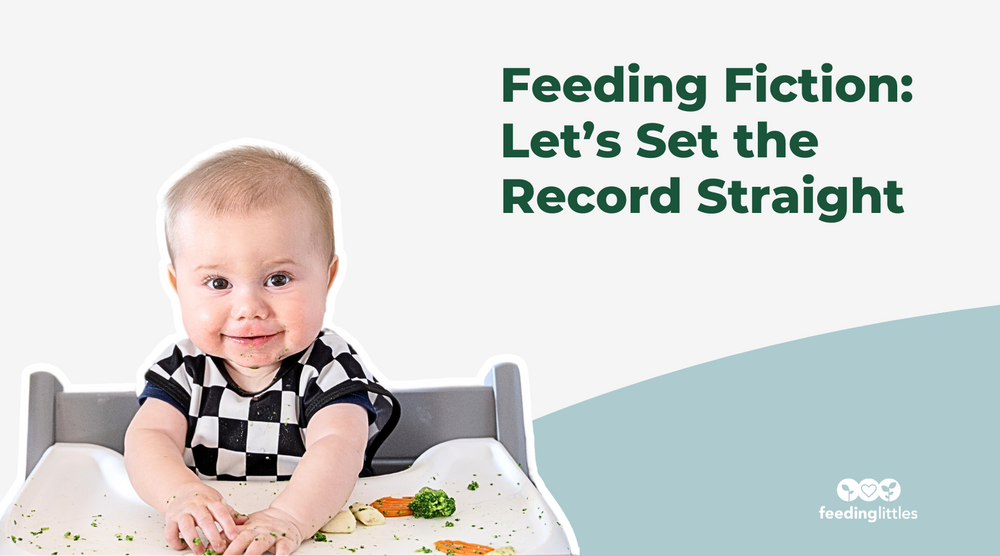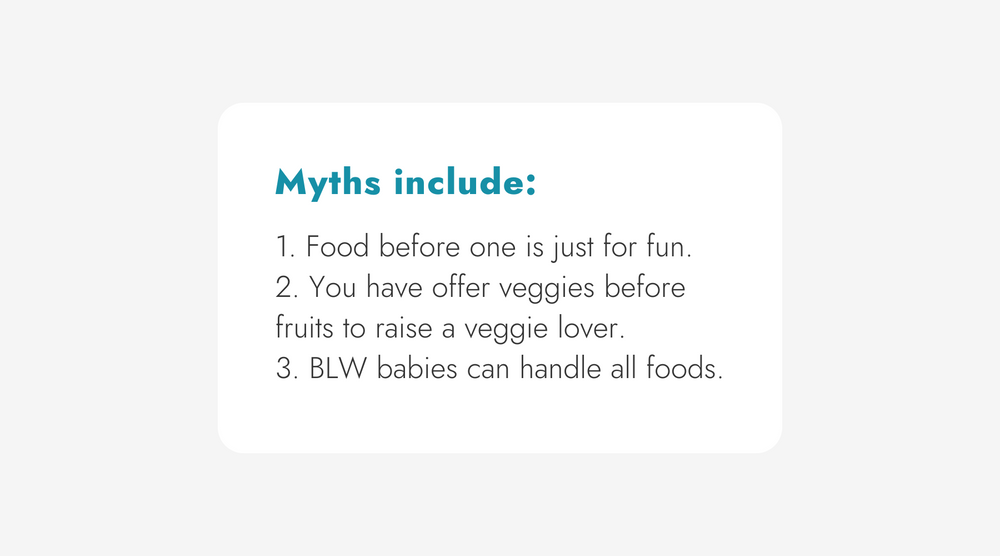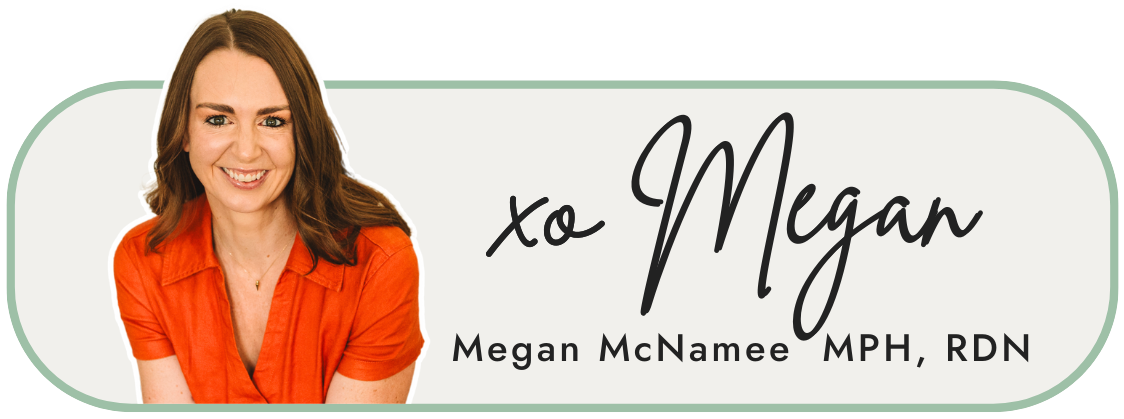
Feeding a baby or toddler can seem very overwhelming. There are so many routes to take, potential products to buy, things to consider. In a time when parents are bombarded with too much information, choosing the right approach for introducing solids may be more overwhelming than ever.

Our followers know that while we love the Baby-led Weaning (infant self-feeding) approach, we also support all families on their feeding journey and recognize that what works for some doesn’t work for all. Yes, we work with families who spoon-feed and love to help them make that a positive experience, too. No, we don’t think that there’s one “right” way to feed a baby. Ultimately, we want feeding to be a positive experience where the caregiver follows the baby’s lead. We also want the caregiver to have positive feelings about the feeding experience, since babies can pick up on anxiety surrounding mealtime.
Eventually, the goal for every baby (barring health or medical issues) is independent, safe self-feeding. This may happen at a different rate for each baby. We’ve seen some confusion about how long to spoon-feed, transitioning from spoon feeding to self-feeding, if food before one is even important, and other feeding fiction online. We want to set the record straight from a nutritional and developmental perspective on a few key feeding issues.
1. Myth: You either choose Baby-led Weaning or Traditional Weaning (spoon-feeding), and your feeding experience will be very different depending on what you choose.
Truth: There are essentially two popular approaches to infant feeding – Baby-led Weaning (infant self-feeding) and spoon-feeding (sometimes referred to as Traditional Weaning). While the approaches seem different, the eventual goal for both BLW and traditional feeding is self-feeding all safe textures. We recommend working toward self-feeding as soon as possible, regardless of how you started.
Baby-led Weaning is defined by babies feeding themselves whole foods (not exclusively purees) from the start. These foods are offered in the shape of a stick or strip because 6-month-olds usually have not developed a pincer grasp and cannot pick up a small piece of food. However, many parents are nervous about babies eating textures like avocado, banana, cooked sweet potato, or softly cooked chicken, so a modified approach may work better for these families. Offering pureed or mashed food on loaded NumNum GOOtensils (or dumping a puree on baby’s tray!) can be a good way to start letting your baby feed themself a texture that makes you feel more comfortable. Once you see them maneuver the food in their mouth, you may be willing to offer them other foods.
If you start with spoon-feeding baby food, we don't want you to linger there for long. In fact, in our Infant Course we recommend no more than 2 weeks of spoon-feeding if that's how you to start. We want your baby to quickly progress to self-feeding with loaded spoons and trying different textures. Learn more about smart spoon-feeding here.
2. Myth: I can start purees at 4 months because it's not a "solid" food, then transition to "solids" at 6 months.
Truth: Anything that’s not breast milk or formula is considered a “solid” or a “complementary food,” and we don’t recommend offering these foods until baby is ready and around 6 months of age.
Some parents confuse the guidance on offering complementary foods because they assume that pureed food is not a “solid.” Recommendations to wait until around 6 months for solids apply to feeding your baby any type of food that isn’t breast milk or formula. Thus, this doesn't mean to start purees at 4 months and then more whole foods at 6 months; it means waiting until around 6 months for any food that's not milk. Keep in mind it's important for babies to sit well before they start solid foods. For most babies, this doesn't happen until around 6 months of age, which is when we recommend starting complementary foods. We talk more about readiness for solid foods in our online Infant Course.
3. Myth: Since "food before one is just for fun," it's not important to give my baby solids until age one.
Truth: Food before one is for much more than fun.
Introducing food in the second half of infancy is extremely important for a variety of reasons. The term “food before one is just for fun” sounds catchy and has gained in popularity since the BLW movement has gained momentum, but the unfortunate reality of this phrase is that some parents take it to mean that food has no importance before one and breast milk or formula is all a baby needs. Some parenting circles consider it best to not give baby any food except breast milk until 1, which can set baby up for a host of developmental, allergenic and nutritional issues.
Let’s be clear: the original intent of this phrase is great! Don’t stress about the quantity of food your baby eats when you serve it to them, especially in the first few months. Breast milk or formula fulfill the majority of baby’s nutritional needs in infancy. We want to see a trend in improvement of your baby’s self-feeding skills.
While their milk provides most of their nutrition, at around 6 months of age babies need iron and zinc from sources other than milk. Additionally, allergenic foods are important to introduce by around 6 months, even if your child has a higher allergy risk (talk to your doc if they do). If you skip offering food until 1 year of age, you may potentially miss a key allergen window.
Babies who don’t have exposure to various food textures by around 9 months might have an increased risk of feeding issues later in life. They also miss exposure to a variety of flavors and may be less likely to accept strong flavors as they get older. We work with toddlers who have struggled to accept new textures and flavors for a variety of reasons, including lack of exposure to any food in infancy, and it can be tough on the entire family. Of course, sometimes kiddos end up in feeding therapy or nutritional counseling for many reasons completely out of anyone’s control. However, not offering any solid food to babies before one is something that concerns feeding professionals.
Above all of these reasons, we encourage parents to watch their baby’s cues and to follow their lead with feeding. Many babies are interested in food as they approach 6 months of age. Not letting them eat food of any kind until 12 months hinders their natural interest in the world around them and doesn’t let them model what they see adults and other children do every day – eat food! They also miss out on the social and language-building element of eating together. Yes, we need to wait until baby is ready for food, but waiting much past 6-7 months doesn’t give your baby some sort of advantage (barring medical issues); it may prevent them from being the eater they're meant to be.
This phrase may also be taken to mean that food introduction can be casual. We definitely agree with keeping mealtimes fun and low stress and not worrying if baby misses a solid food meal due to teething or illness. Just remember that exposure matters – babies who get more practice with food are generally more skilled eaters.
4. Myth: My baby must have a pincer grasp before I give them finger foods.
Truth: Your baby can have all types of soft foods, as long as they can pick them up! They generally need strips or wedges of food when they start at 6 months.
Many parents think their baby must be able to pick up tiny pieces of food to give them table foods. Since 6-month-olds lack a pincer grasp, offering diced up food can actually make them frustrated. Strips, wedges and sticks of soft foods like roasted broccoli, steamed chicken, buttered toast and roasted sweet potato are great options. As your baby becomes a more skilled self-feeder, they can handle smaller pieces of food.
5. Myth: If I decide to spoon-feed my baby, I am in control of the process.
Truth: It’s important to follow your baby’s lead, whether you're spoon-feeding or letting them feed themselves.
Some parents become frustrated when their spoon-fed baby starts grabbing for the spoon. We've even seen parents hold down their baby's arms or not let them reach for the spoon. Remember, we want all babies to eventually self-feed, so this is a great step! Offer them the spoon (or a NumNum GOOtensil) loaded with some mashed or pureed food, and try some soft finger foods like avocado or banana spears, salmon, or steamed green beans after that.
6. Myth: If I chose to spoon-feed, I should continue it well into toddlerhood.
Truth: We recommend that your baby is completely self-feeding by no later than 14-16 months, and most will be self-feeding earlier than that barring medical or developmental issues.
It’s important for babies who are spoon-fed to eventually try finger foods and various soft textures. Spoon-feeding and using purees or lumpy food are simply a stepping-stone in traditional feeding; we don’t stay there forever. Of course, if your baby has developmental or medical issues, this may not be the case and spoon-feeding may be required for longer.
Some parents love spoon-feeding their baby and enjoy making baby food. If that works for you, great! However, since spoon-feeding is meant to be temporary, parents won’t always be feeding their baby with a spoon. Rather, the baby will transition to feeding themselves. That’s why technically you don’t “switch” from spoon-feeding to BLW – inherent in “traditional feeding” process is the idea that your baby eventually puts food in their own mouth with their hands or utensils after graduating from spoon-feeding.
Even though it’s a messy process, let your baby and toddler feed themselves a variety of foods. Regularly putting food in your toddler’s mouth and not letting them try it themself prevents them from developing the skills needed to self-feed. It can also lead to distracted eating or overeating, as well-meaning caregivers sometimes miss fullness cues and want to make a toddler finish a certain amount of food.
7. Myth: If you're spoon-feeding a baby, you have to stop solid foods for two weeks before letting them try finger foods.
Truth: You can switch from spoon-feeding to self-feeding in the same meal.
The myth that there should be a “rest period” after stopping spoon feeding and before letting your baby self-feed whole foods has been flying around BLW boards for years, and it’s simply not backed by science. The theory behind this “guideline” is that when babies go from being fed a puree on a spoon to putting whole foods in their own mouths, they are more likely to choke because they will swallow the food without chewing. Well, babies new to BLW who have never had any kind of food may also try to swallow without chewing – that’s what they have the protective airway mechanism that is the gag reflex. In fact, we use smart spoon feeding and self-feeding other textures within the same feeding therapy session all the time. The entire premise behind BLW is that it is safe for a baby to self-feed all textures; if this 2-week “rule” were true, it wouldn’t be deemed safe to let baby self-feed yogurt, hummus and guacamole while simultaneously letting them self-feed spears of avocado or cooked broccoli.
8. Myth: If my baby gags, they're not ready for solids.
Truth: Gagging is a normal reflex and is your baby’s way of safely protecting their airway. However, gagging should improve over time.
For many babies new to self-feeding whole foods, gagging is a common thing. When your baby gags, it means they haven't chewed their food well enough to swallow just yet. It's actually a good thing - your baby's body is protecting them! However, gagging should get better with practice. If your baby continues to gag very frequently after many weeks of practicing with real foods, talk to your pediatrician. Excessive gagging can lead to a feeding aversion. To see videos of what gagging looks like and to get more safety tips, check out our Infant Course.
9. Myth: My baby does Baby-led Weaning and is a pro eater - I don't have to worry about choking hazards.
Truth: A choking hazard is a choking hazard for all babies, independent of how they started solid foods.
Just because a baby starts food utilizing BLW doesn’t mean they can “handle” choking hazards better than another baby. Cut grapes, cherries, and cherry tomatoes into quarters, and remove skin or small bones from meat. Avoid popcorn, chips, gum, and hard candy until age 4. Apples and raw carrots are unexpected choking hazards; we recommend softening both or shredding before serving (until age 4). Get a complete list of choking hazard foods in a beautiful printable in our Infant Course!
10. Myth: You have to offer babies veggies before fruits or they'll never love veggies.
Truth: You do not have to offer only vegetables if you want to raise a veggie-lover.
Fruit won’t ruin your baby. Have you ever tasted breast milk or formula? Yup, very sweet. Your baby already knows what sweetness is, and starting on just vegetables hasn’t been shown to improve his diet quality long-term. What does help foster adventurous eating is exposure to ALL foods, with lots of repetition – some babies don’t like foods until they’ve seen them 15-20+ times!
Make sure to have at least one veggie and/or fruit at every meal for exposure to different flavors and nutrients. Don’t forget to pair the produce with a high-iron food like beef, salmon, chicken, whole grains, lentils or beans!
11. Myth: Babies shouldn't have a "real" birthday cake.
Truth: When your baby turns 1, you can offer a sugary cake – or not.
Do whatever makes you feel comfortable. (Our whole team did real birthday cake for their kids.) If you want your baby to eat a "healthified" cake, fruit, or a cupcake made with applesauce, great – just don’t overly stress yourself. Many, many babies don’t eat their first birthday cake – offering one is more for fun, tradition, even just photos. We’ve also seen funny soft taco, BBQ and watermelon first birthday smash photos that look just as fun if you want to try something unique. Read more about our philosophy on this here.
If your baby eats some cake, they will be OK. Remember that all foods fit, and we need to teach our kiddos that it’s not a big deal to have some cake eventually. Focus on the fact that you survived your first year with your baby! That calls for some cake for you!
